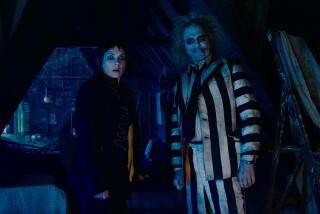‘Billy Bathgate’: Biting the Bullet : Benton Defends Gangster Epic Ambushed by Rumors, Delays
- Share via
It is as if Robert Benton stumbled into his own picture only to have Dutch Schultz and his boys speed by and open fire with submachine guns.
But instead of bullets, the Oscar-winning director has been dodging rapid-fire rumors and criticism.
On Friday, “Billy Bathgate,” Benton’s long-awaited gangster film for Disney’s Touchstone Pictures, opens nationwide. For months, the talk around Hollywood has labeled it a problem picture.
Rumors have surfaced over the four-month delay in its release date, spiraling costs, re-shooting schedules, strife between Benton and Dustin Hoffman, and strife between Benton, Hoffman and Walt Disney Studios Chairman Jeffrey Katzenberg. Hoffman himself criticizes certain choices made during the film’s production (see accompanying story, F7).
Some dubbed the film “Billygate,” in reference to the legendary flop “Heaven’s Gate,” even though the advance word now is that it is no such disaster.
During production, Disney executives privately expressed anxiety about whether the cost of the movie--said to be $40 million--would be recovered at the box office.
At the center of the controversy is Benton, a soft-spoken, 59-year-old New Yorker with a graying beard and glasses who looks more like a tenured English professor than the screenwriter of “Bonnie and Clyde.”
“What is it that I’ve done?” Benton asked, trying to fathom why “Billy Bathgate” has generated so much gossip and speculation.
Some say “Bathgate” might be providing an opportunity for Hollywood to criticize Katzenberg, an intense and driven studio chief who wrote the now-famous memo that sounded the alarm about big-budget, star-driven movies. Some resented Katzenberg’s seemingly new-found role of industry spokesman.
After years of success with such modestly-budgeted movies as “Down and Out in Beverly Hills” and “Pretty Woman,” Disney’s string of hits ended earlier this year. Although “What About Bob?” performed well earlier this year, the studio’s only runaway hit was “101 Dalmatians,” a 30-year-old animated feature.
“I think there is a little venting of hostility (against Katzenberg),” said one veteran publicist. “I think this movie (“Billy Bathgate”) is a device people are using . . . to go after Disney itself.”
In an interview, Benton acknowledged there were delays in filming “Billy Bathgate,” that he re-shot a number of scenes--some only a month ago--and that he filmed a new ending after being dissatisfied with the one in the original script.
But he denied that his relationship with Hoffman--his collaborator on the Academy Award-winning film “Kramer vs. Kramer”--has soured, and said that despite disagreements with Katzenberg, the studio executive always deferred to him about what to shoot.
“We talked every day about the creative stuff that was coming in and about the budget,” Benton said of Katzenberg. “He was always very forthright and very understanding so that I never felt any pressure from him. But I felt a lot of pressure because it was a large picture, a bigger picture than I’d ever done. The schedule was a third longer than any schedule I’d ever done.”
Benton said that Katzenberg, Hoffman and others knew going in that it would be a difficult film to make, that E.L. Doctorow’s complicated novel was not simply a gangster story.
“I said to them, ‘This is not going to be an extremely violent picture. I’m not interested in that.’ They said that was fine. I said, ‘It’s going to have a certain amount of nudity, it’s going to have a certain amount of language.”’ All parties agreed to proceed, Benton said.
“Billy Bathgate” is set in Depression-era 1935 and centers on a teen-aged boy from Bathgate Avenue in the East Bronx who dreams of a better life and finds it by joining mobster Dutch Schultz’s gang. Billy (Loren Dean) comes into manhood surrounded by ruthless mobsters in an underworld filled with mistrust and suspicion. Along the way, Billy falls in love with Schultz’ mistress, Drew Preston (Nicole Kidman).
It was producer Arlene Donovan’s suggestion that Dutch Schultz be portrayed by Hoffman--who had remained close to Benton over the years.
“We agreed to collaborate the same way we did on ‘Kramer,’ ” Benton recalled. On that film, he said, it was not unusual for Hoffman to come up with “100 ideas,” many of which worked, and some that didn’t. All Hoffman requested, Benton said, was that the director listen to him.
As he did with “Kramer,” Hoffman took part in the casting of “Billy Bathgate.” But sources close to the production said Hoffman was not fully convinced that the 22-year-old Dean--who is older than the novel’s Billy--was right for the pivotal role. Furthermore, they said, Hoffman yearned to work closely with Dean, just as he had done with child actor Justin Henry on “Kramer.”
“When Dustin did ‘Kramer,’ one of our decisions was that Justin Henry couldn’t get two sets of directions from two different people,” Benton recalled. “So, when I wanted Justin to do something, I told Dustin. . . . But that is a 6-year-old kid. Loren Dean is of an age you can’t do that with.”
Then came other glitches. When filming began in New York, Disney’s accounting system briefly went haywire, the company “got socked” in negotiations with the Teamsters union, and the cost of the production design soared, according to sources on the set.
By the time the crew arrived in North Carolina for the next round of shooting late last year, Benton was losing a day a week.
Donovan said Katzenberg initially wanted to release the picture early this summer, but the amount of work that still needed to be done made re-shooting difficult. Hoffman was off filming “Hook” for Steven Spielberg and co-star Kidman was making a film in Ireland.
“As we realized the enormity of what we had to deal with, the amount of material that needed to be re-shot, the unavailability of Dustin and Nicole, it just seemed impossible,” Donovan said.
Meanwhile, Benton said, he became aware that he didn’t like the ending, which called for Billy to duck under a bar during a crucial shootout. Billy couldn’t be left alive, Benton thought, because he was a witness to the killings.
“I thought it was bad for his character, that while his friends died, he stood there and he didn’t take action,” Benton said. So a new ending had to be filmed.
“This was not the first time I had re-shot an ending,” Benton said. “The first time was on ‘Kramer.’ ”
In all, Benton said, he re-shot about five scenes.
“I don’t think that’s a lot of re-shooting,” Benton said. “ . . . If you were making a vacuum cleaner and you saw that you made a mistake, you’d go back and fix it. But in a movie, there is something wrong about that.”
Hoffman reportedly went to Katzenberg and expressed his displeasure in how the film was turning out. According to Vanity Fair magazine, Hoffman told Katzenberg: “Jeffrey, you will not make your money back, you don’t have a chance, if there isn’t work done on this picture.”
The magazine said that Katzenberg was so disappointed in the second cut of the film that he talked about removing Benton from the picture and that Benton later asked him if he wanted him to resign.
Benton said he does not recall that conversation. Katzenberg is on a cruise in the Mediterranean and was unavailable for comment, aides said.
Of reports that Benton and Hoffman had a falling out, Benton said, “Dustin and I lived next door to each other in Pinehurst (N.C.) and just down the road from one another in Wilmington (N.C.),” Benton said. “We would drive into work together one or two days a week when we were in Pinehurst. We worked together six days a week. On Sunday mornings, Dustin would either call or come by the house. We spent Christmas together. If Dustin’s feelings were hurt, I didn’t get any indication of it.
“The last conversation I had with Dustin was brief,” Benton added. “It was a loving, pleasant conversation. He asked if we could re-shoot another scene. I said, ‘Dustin, we can’t. We’re down to the line. (I) would if I could.’ He said, ‘OK. I understand. I wish I knew that before.’ I said, ‘I’m sorry, but this is what the schedule is, we can’t do it.’ ”
More to Read
Only good movies
Get the Indie Focus newsletter, Mark Olsen's weekly guide to the world of cinema.
You may occasionally receive promotional content from the Los Angeles Times.








